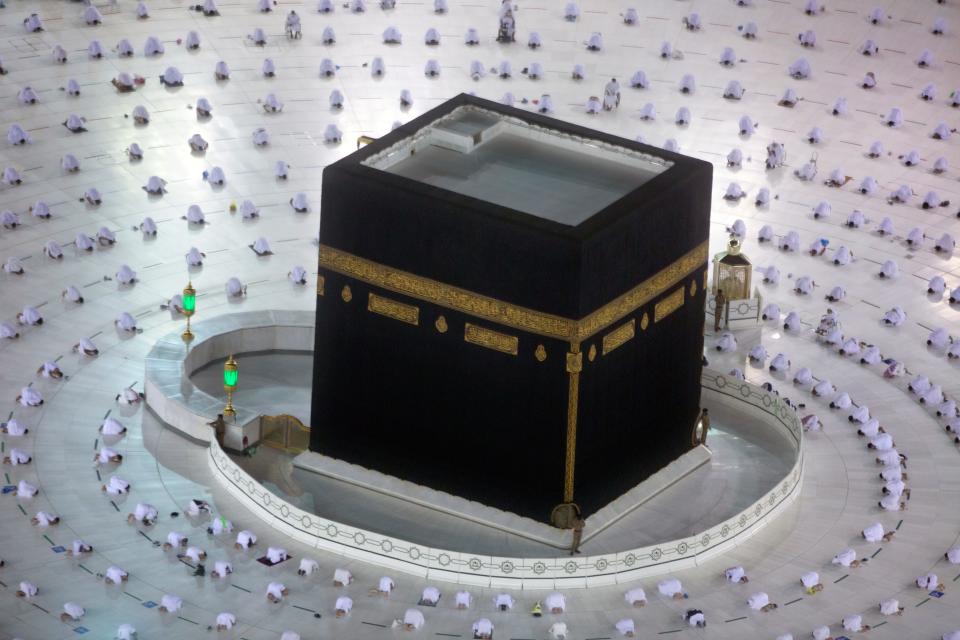What is 'the sacred month' of Ramadan all about? Fasting, Eid al-Fitr and more explained

Ramadan is the ninth month of the Islam calendar, a holy month designed for prayer and fasting. It begins and ends with the shape of the crescent moon, which is why Ramadan is not set on any specific days annually.
Each year, the day it starts and ends changes as it goes with the moon calendar. Depending on the region, it may even change the dates on which Ramadan is celebrated.
This year in the U.S. it's being celebrated from Saturday, April 2 to Sunday, May 1.
Muslims believe that Ramadan is meant to strengthen their relationship with God. The religious holiday involves fasting, praying and being around loved ones.

Why celebrate Ramadan?
Muslims believe that during the month of Ramadan, God gave the Prophet Muhammad the Qu'ran, Islam's holy book, in 610 A.D. It was the first time God revealed to Muhammed that he was a prophet in charge of carrying God's message across the Arabian Peninsula, according to Homayra Ziad, Director of Islamic studies at Johns Hopkins University.
"The Qu'ran was revealed during the night of destiny for Muslims, that's why Ramadan becomes the sacred month," Ziad told USA TODAY.
"It’s a month of charity and generosity," Caren Elhenway, a Lebanese and Egyptian immigrant living in the U.S., told USA TODAY. "It’s a time of doing good deeds for those near and far, and a time of spiritual reflection."
What does the Qu'ran say about Ramadan?
The Qur’an presents fasting as the continuation of a tradition that was prescribed to those who came before Muhammad – to Jews and Christians, according to Ziad.
The Qur'an reads:
O you who believe! Fasting is prescribed for you as it was prescribed for those before you, that perhaps you may be reverent….The month of Ramadan is that in which the Qur'an is sent forth as a guidance for humanity and clear portents of the guidance, and the Criterion between right and wrong. So whosever of you bears witness to the month, then formal fasting; …And when my servants ask you [the Prophet] about Me [the Lord], then truly I am near. I answer the call of the caller when he calls to Me….
Qur'an (Surah al-Baqarah (2):183-186)
(translation adapted from The Study Qur’an (ed. Seyyed Hossein Nasr) and The Sublime Qur’an (tr. by Laleh Bakhtiar))
Why do Muslims fast?
The idea behind fasting is to practice self restrain, which is one of the pillars of Islam. Fasting is done from dusk till dawn. Every Muslim that has reached puberty, and is physically capable, is required to fast.
Muslims must abstain from:
Liquids
Food
Sexual activities
Negative thoughts
Bad intentions
"Muslims, like any religious community, are diverse in belief and practice. Many fast, some choose not to fast at all, others may be creative in how they fast," said Ziad.
Although there are no sexual activities during the fast, couples are allowed to have intimate encounters at night once the fast is broken.
Muslims ask for forgiveness during Ramadan for the sins they have committed. It is about repentance. A habit takes a month to form, so Ramadan being a month-long allows for the habit to form, according to Ziad.
"It becomes a time to commune more deeply with God," said Ziad. "It becomes a time to become more aware of God's mercy and to seek that forgiveness."
Why are Easter and Passover so late in 2022? Blame the moon and a cacophony of calendars
Ramadan at Starbucks: How companies can profit by respecting religious diversity
How to break the fast?
During Ramadan, there are five daily prayers. Muslims break their fast after the evening prayer with the meal called ifṭār. This meal is often celebrated with friends and extended family. Ifṭār traditionally starts with dates and water.
"Dates are one of the main staples of the Arabian Peninsula," said Ziad. "During the time of the Prophet, they were considered to be considered to be superfoods."
What if you can't fast?
A lost day can be made up by extra days of fasting. People who get sick or are traveling during Ramadan can be exempt from fasting, but would have to fast for additional days after Ramadan is over to make up for the days missed.
"A lot of time is freed up when you're not thinking about food," Ziad said. "When that space is clear, then there is time for a lot of meditation. When you become more aware, you become more open to see God's mercy at play."
Those who do not fast may choose a substitute like feeding the poor or giving money to feed others, according to Ziad. Fasting can also be modified to what a person is capable of doing.
Pregnant and nursing individuals as well as people on their periods are exempt from fasting, as well as older or weaker participants or those with mental illness.
What is Eid al-Fitr, the end of Ramadan?
The end of Ramadan is a celebration known as Eid al-Fitr, one of the major holidays for Muslims. Families and friends get together, and there is a special communal prayer to mark the end of Ramadan. People often dress up in traditional clothing and eat traditional foods.
Traditional foods depend on the region in which Ramadan is being celebrate. According to Halifax Public Libraries, maamoul is a shortbread cookie eaten in Syria and Lebanon, made from dates, pistachios or walnuts. Bolani is a thin-crusted bread with a vegetable filling traditionally eaten in Afghanistan. Tufahija, a dessert composed of poached apples drenched in sugar and stuffed with walnut, is enjoyed by Bosnians.
"It's a celebration that that that brings families and friends together to be happy that they completed the month of fasting," Ziad said.
This article originally appeared on USA TODAY: What is Ramadan, the Muslim holy month? Fasting, Eid al-Fitr explained

